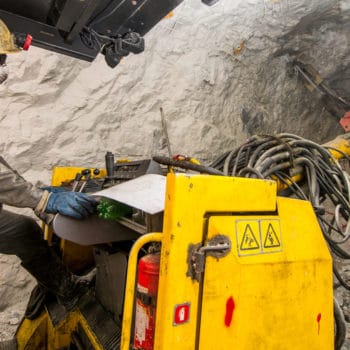Why We Love It
-
$77,860Potential Avg. Salary
-
2.6%Job Growth Rate
-
Growing DemandJob Outlook
-
Dependable Daily WorkloadCareer Attribute
Nuclear Chemists research organic and inorganic atoms and radioactive substances and the nuclear processes they create. They consult with engineers to conduct analysis of research projects, interpret test results and maximize nuclear test and medical equipment efficiency. They also may apply that knowledge to cutting edge medical treatments and nuclear waste disposal.
Recommended Schools
What is a Nuclear Chemist?
The following responsibilities are common for individuals in the Nuclear Chemistry field:
In the medical field:
- Research how radioactive isotopes and materials can mutate and change living organisms and their biochemistry
- In charge of x-ray, external beam radiotherapy, radionuclide therapy and brachytherapy
In the energy sector:
- Research the development of fuel resources and fabrications
- Research the synthesis of thorium and uranium absorption of fission products
- In charge of all the safety procedures during nuclear reactor operations
A Day in the Life
Nuclear Chemists conduct research in areas like nuclear imaging, nuclear fission and nuclear fusion. They tend to work in theoretical research, whereas a nuclear chemical engineers would typically work in power plants and nuclear waste facilities.
They tend to work in two major industries, medicine and energy. They are specialists in their field and often act as advisers to engineers, physicists and other doctors. As you advance you may also choose to specialize further and work as a senior research scientist in a particular specialty area of nuclear chemistry.
They will spend the majority of their time in the laboratory. Operating research investigations, recording findings and analyzing the data then presenting those findings to the particular company or client they are working for.
Typical Work Schedule
The position offer would be a full-time 40 hour work week.
Projected Job Growth
Projected job growth for Nuclear Chemists is steady and secure. With the ever changing needs of energy needed throughout the World and rise and adaptation of nuclear energy and also the constant growing demand for medical necessity and treatments the career of Nuclear Chemist is promising and dependable.
Career Progression
- Early Career – Obtain a bachelor’s degree in a subject such as organic chemistry or biochemistry and statistics and become a research assistant in a lab
Mid-Career – Obtain a master’s degree in nuclear chemistry or biochemistry and you can complete your own research projects
Late Career – Obtain a Ph.D in nuclear chemistry and also choose a post-doctorate specialty field of study such as radiochemistry or nuclear reactions. You will be able to direct you own research projects and publish your findings in scientific articles.
Recommended Schools
How To Become a Nuclear Chemist
To become a Nuclear Chemist you must begin with a bachelor’s degree in chemistry. Followed by a master’s degree or a doctorate degree in Nuclear Chemistry and a specialty. To prepare for a career in this particular field, you should start with courses and studies in physical chemistry before moving into a more specialized program. A complete and thorough understanding of physical chemistry and science is an important educational prerequisite that can help prepare you for a successful career. Typically the higher education level you achieve in this field the more career options will come available to you.
Many people who choose to pursue this field as a career choice, choose this particular path because it allows you perform a wide range of various and diverse tasks and skills in a laboratory setting. Many of those pursuing this course of study get satisfaction from solving critical problems in the healthcare and/or energy fields.
This position requires a BS or MS degree in chemistry or environmental science or a similar field. They need to have excellent hand written and verbal communication skills with an ability to prioritize and organize. They must also have the ability to work independently and in a team setting. Excellent IT skills are also essential.
Nuclear Chemist Salary Data
We’ve provided you the following to learn more about this career. The salary and growth data on this page comes from recently published Bureau of Labor Statistics data while the recommendations and editorial content are based on our research.
National Anual Salary
Low Range
$52,370Average
$77,860High Range
$125,450National Hourly Wage
Low Range
$25/hrAverage
$37/hrHigh Range
$60/hrHow do Nuclear Chemist salaries stack up to other jobs across the country? Based on the latest jobs data nationwide, Nuclear Chemist's can make an average annual salary of $77,860, or $37 per hour. On the lower end, they can make $52,370 or $25 per hour, perhaps when just starting out or based on the state you live in.
Salary Rankings And Facts
#150 Nationally for All Careers
Above Average Salary Nationally
Programs and Degrees
Here are the most common degrees for becoming a Nuclear Chemist. a is usually recommended and specifically a degree or coursework that prepares you for the particular field, see below.
Highest Education Among Nuclear Chemists
- 18.4% Doctorate
- 19.7% Masters
- 54.3% Bachelors
- 4.4% Associates
- 2.7% College
- 0.3% High School
- 0.1% Less than High School
Job Growth Projections and Forecast
2014 Total Jobs
91,1002024 Est. Jobs
93,500Job Growth Rate
2.6%Est. New Jobs
2,400How does Nuclear Chemist job growth stack up to other jobs across the country? By 2024, there will be a change of 2,400 jobs for a total of 93,500 people employed in the career nationwide. This is a 2.6% change in growth over the next ten years, giving the career a growth rate nationwide of Above Average.
Growth Rankings And Facts
#530 Nationally for All Careers
Above Avg. Growth Nationally
What Companies Employ The Most Nuclear Chemists
| Industry | Current Jobs | New Jobs Needed | % Increase |
|---|---|---|---|
| Research and development in the physical, engineering, and life sciences | 16,100 | 2,900 | 3% |
| Pharmaceutical and medicine manufacturing | 14,800 | -1,500 | -2% |
| Testing laboratories | 9,200 | 1,100 | 1% |













